Central Morecambe – Life as on-going personal construction,
the not so inexplicable appeal of Captain Black [i]
and the Land of Lost Content . . .
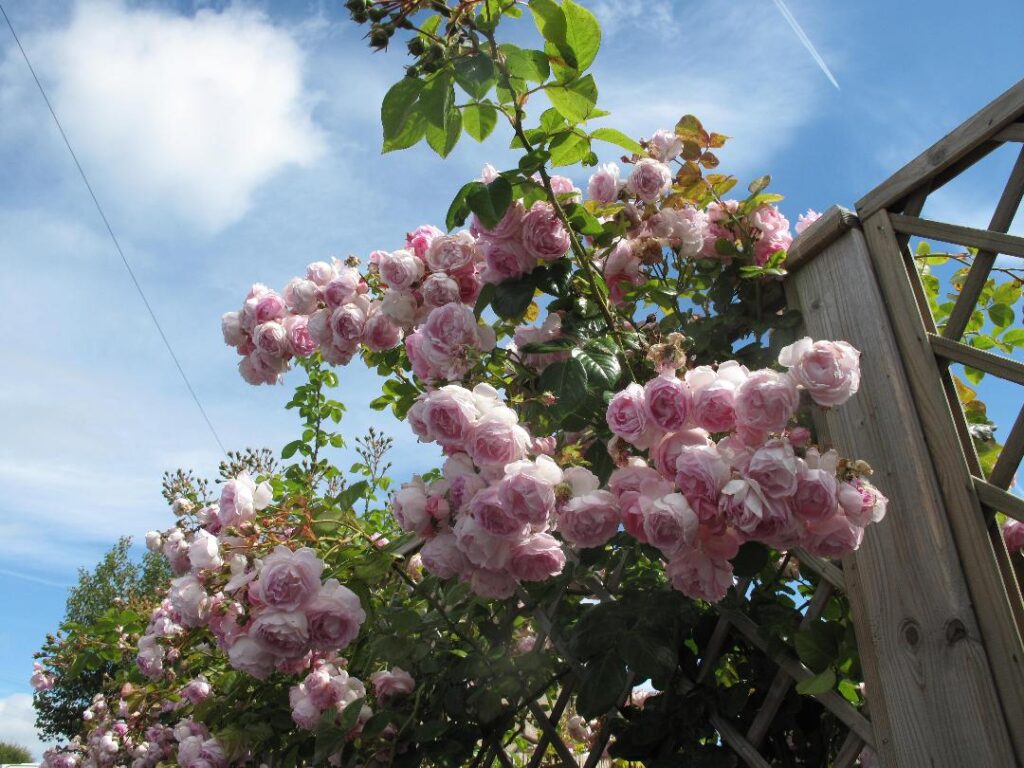
Roses[ii] in Trumacar, Heysham – a nostalgic throwback to July 2022
While waiting for the Mysterons to turn up and finish our kitchen[iii], inevitably, other local journeys have racked up my archive of images with little general interest. One question I asked myself back in December 2022, when an outwardly inconsequential suburban walk to and from Oxcliffe Road Post Office in grey-nothing weather, gave rise to a calmly “visionary” experience was: Did it happen because I had no camera?
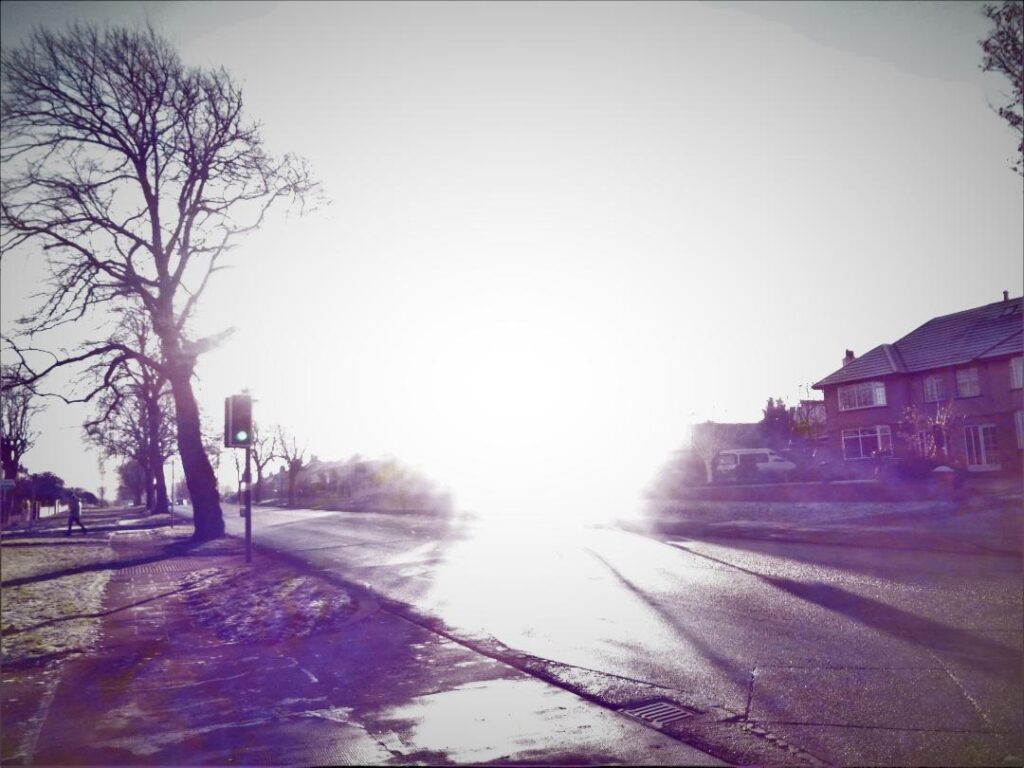
White-out on the Morecambe Road, a frosty December day, 2022
Did knowing that I had no way of recording even the setting of such a rare ‘event’, unloose me from the bonds of material space and overlapping reality? Since the hope of greater freedom is partly the reason why I never wish to have or carry any kind of mobile phone or equivalent device (on cycles and walks, I’m literally beyond contact, a common release for everyone not so long ago), this possibility should’ve been immediately obvious.

Retracing the route from Oxcliffe Post Office with a camera two days later: although the weather was identical,
the ‘visionary’ experience remained only a reassuring memory. 2nd Dec 2022
Yet without photographs, so much that we experience would be lost. The versions of days-out reconstructed retrospectively through images, may not be the ‘real’ thing (whatever that is), but they often discover unsuspected directions, even worlds. Though most of these are too personal or arcane to be communicable, without the photos – revisited sometimes after years of forgetfulness – such exploration or reconstruction would be impossible.
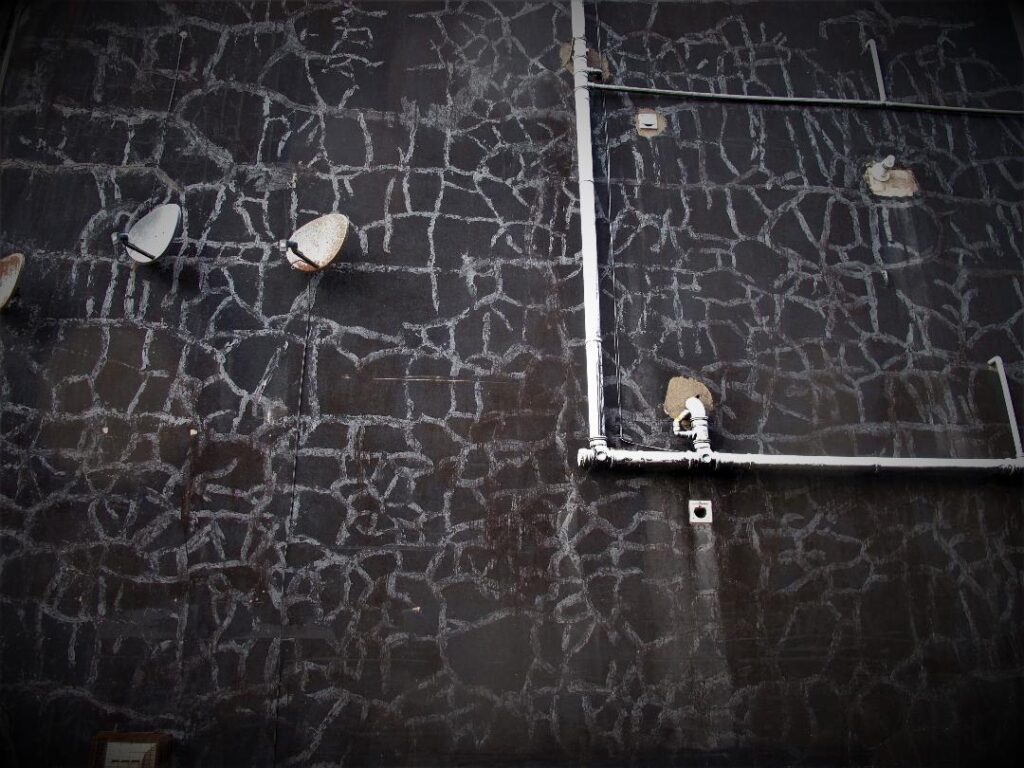
Cracks in communication . . . during which content seeps away. Central Morecambe East, Oct 2022
As for those unexpected feelings which make death serenely laughable[iv], will I ever come to terms with them? Their calm suburban form[v] on the return walk from Oxcliffe Road was very different from the escalation arising from more rural settings in the past – the after-effect of which, on returning to the confines of a limiting body, can be intensely claustrophobic. Was the accepting tranquillity arising from December’s experience of infinite calmness, due to the distancing effect of being older or more resigned, or due to some dilution caused by an apparently mundane environmental setting?
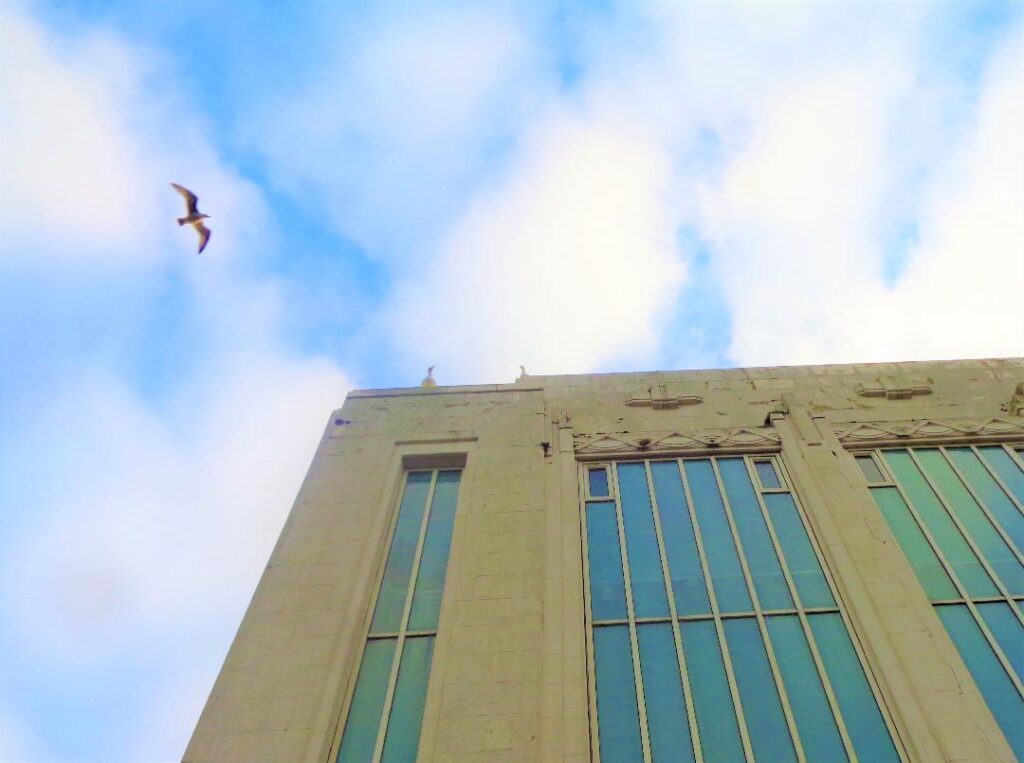
If only that infinite calmness could sail the back of my mind permanently – a constant balm –
practical things automated, all mental stress unheeded . . . 18th January 2022
After a visionary experience (I remain in search of better classifications), for a while at least, you reconstruct life with altered priorities. Such events underscore the degree to which our daily lives are a completely subjective – even fictional – experience. Of course, there are plenty of unavoidable overlaps – positive and negative – with other people, events and institutions. It is almost solely these overlaps which we have (unjustifiably, but certainly practically) come to view as “reality”.
Reading a section of John Donne, the Reformed Soul by John Stubbs[vi] last night, it was weird to realise (again) just how seriously people took the spiritual (and its downside, the dogmatic) in the past. That scientific materialism is now by far the most powerful religion is clear: even to most of those who consider themselves more supernaturally religious, their beliefs remain, perhaps inadvertently, subservient to the new regime.
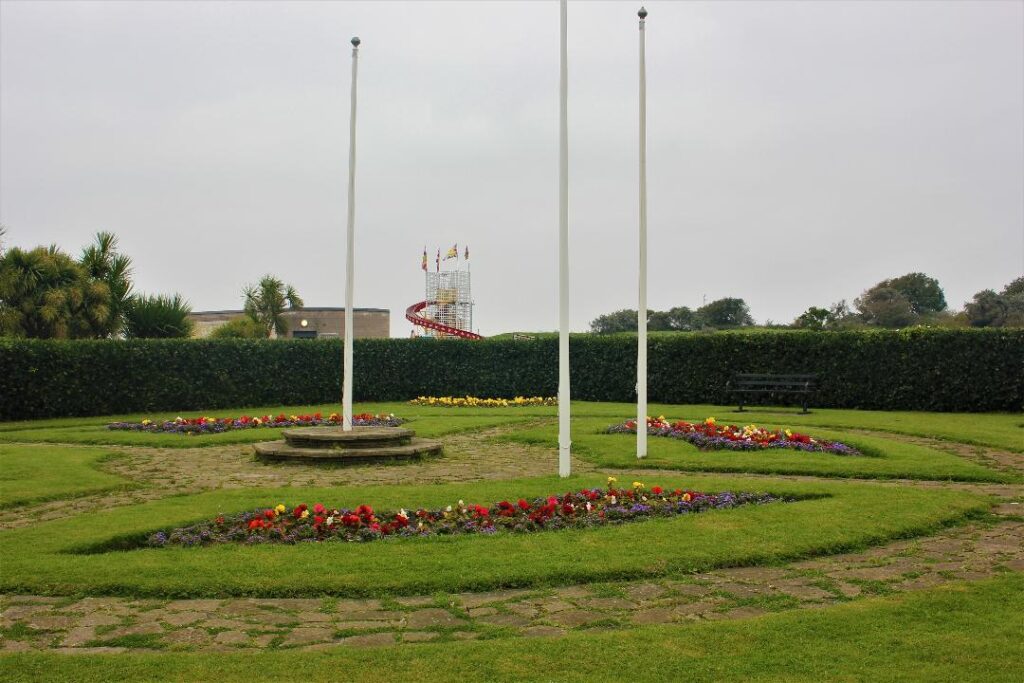
Distant, peaceful, helter-skelter[vii] in gardens due to be decimated by the Eden project?
26th Aug 2019
More than a year ago now, rewatching Butch Cassidy and the Sundance Kid (1969) provided a perfect example of how simple, retrospective feelings – consciously or subconsciously, and whether we like them or not – colour both experience and value[viii]. Overlooking the implausibilities with which this (and almost all films and other narrative art) is inevitably tinged, we were enjoying it: the amorality, the humour, the friendship, and perhaps most of all, the sublime landscapes of Utah and Colorado.
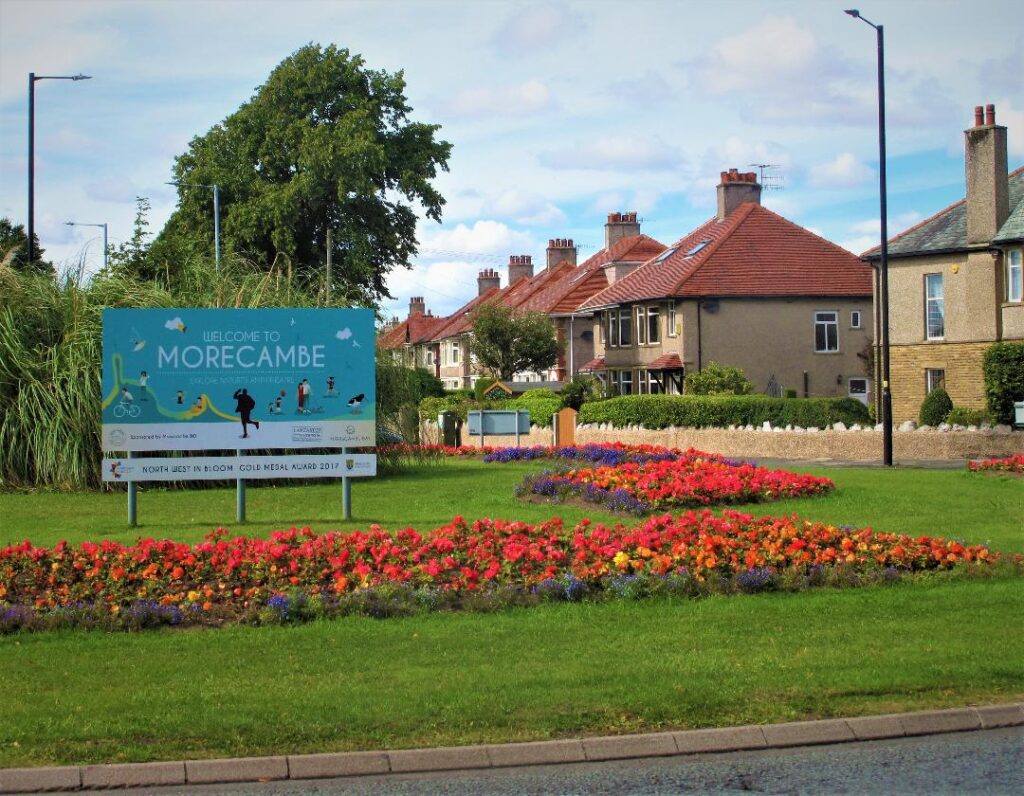
Shrimp roundabout, (named after the pub which has since become a Toby carvery) implausibly omitting all traffic.
South-eastern approaches, 21st August 2022
Underlined by having been exhaustively reused since, the tried and tested formulas employed in Butch Cassidy and the Sundance Kid, remain perfect in their expectations. We accept the film as flawless of its type, and it expects our acceptance and knowingness. It did even when it was first released in 1969. Yet maybe without meaning to, as with so many films, Butch Cassidy and the Sundance Kid, says more about the late 60s and early 70s than it does about the fading Wild West of the early 1900s.
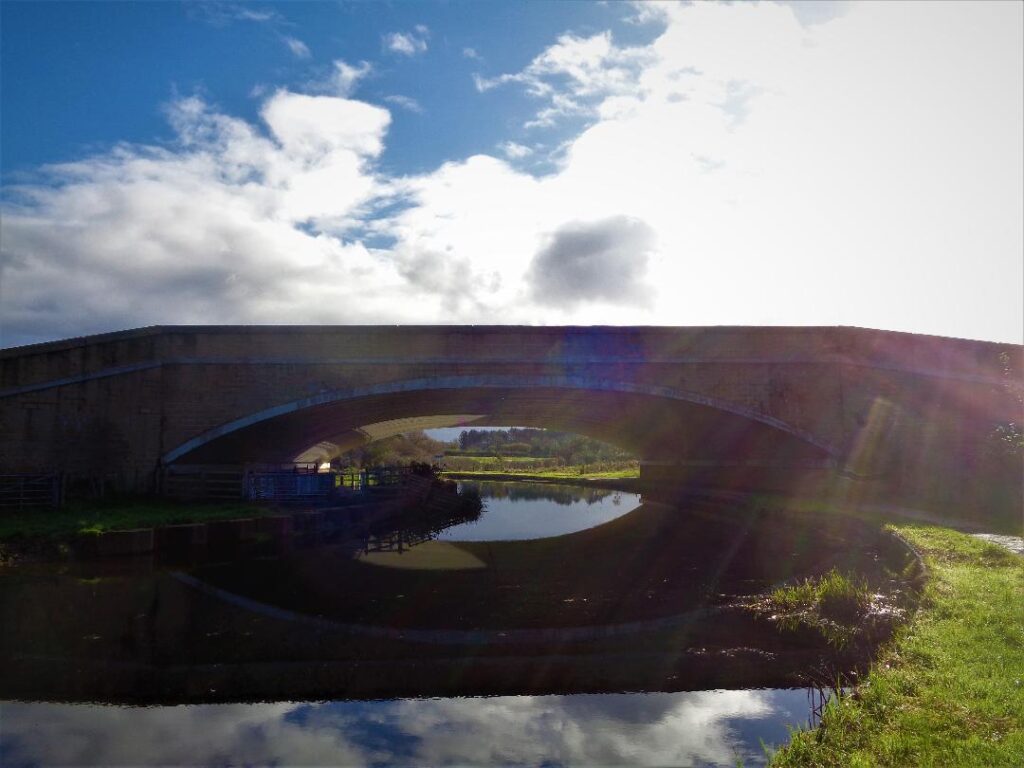 The wild east of Morecambe where the trail of the Bay Gateway[ix] strides the canal. 4/11/2022
The wild east of Morecambe where the trail of the Bay Gateway[ix] strides the canal. 4/11/2022
Remembering the late 60s and early 70s well – if not always specifically – it’s impossible to escape the atmosphere of their days and nights, their faiths and to a lesser extent their dreads – they echo through Butch Cassidy and the Sundance Kid so strongly. Indeed, I don’t want to escape them. It is them[x] more than anything, which makes the film indulgently enjoyable.
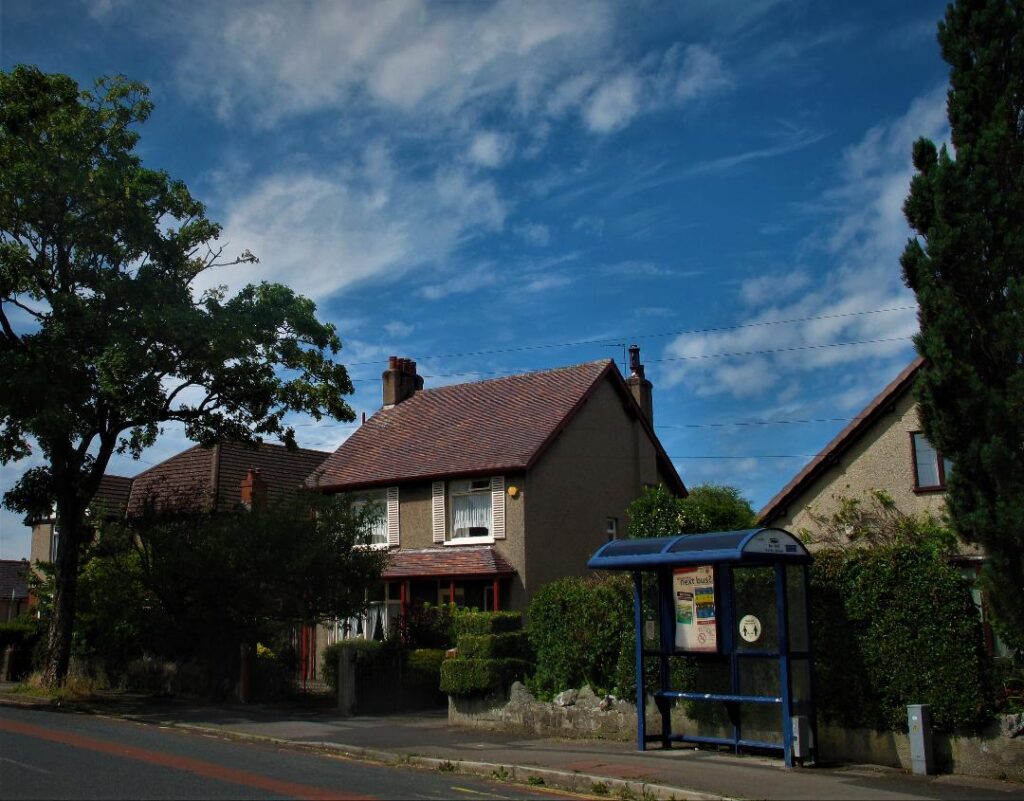
Bus stop to the past . . . central outskirts, 24th July 2022
Every day that goes by, I miss the 70s more, and have come to think of that decade as the last good one. Undoubtably it was less homogenised than parcelled time in Western societies has since become, but equally, this impression is bound to be exaggerated by my perspective. As with all history looked at expectantly (which connects to my sense of being doomed: “We were always doomed. Always too ‘clever’ . . . yet totally without wisdom”[xi]) the 60s and 70s were a failure. That was our best chance at changing direction as a race and we blew it . . . and despite all the clear warnings of extinction, we are still dragging our feet over things which should have been forced through 50 years ago.
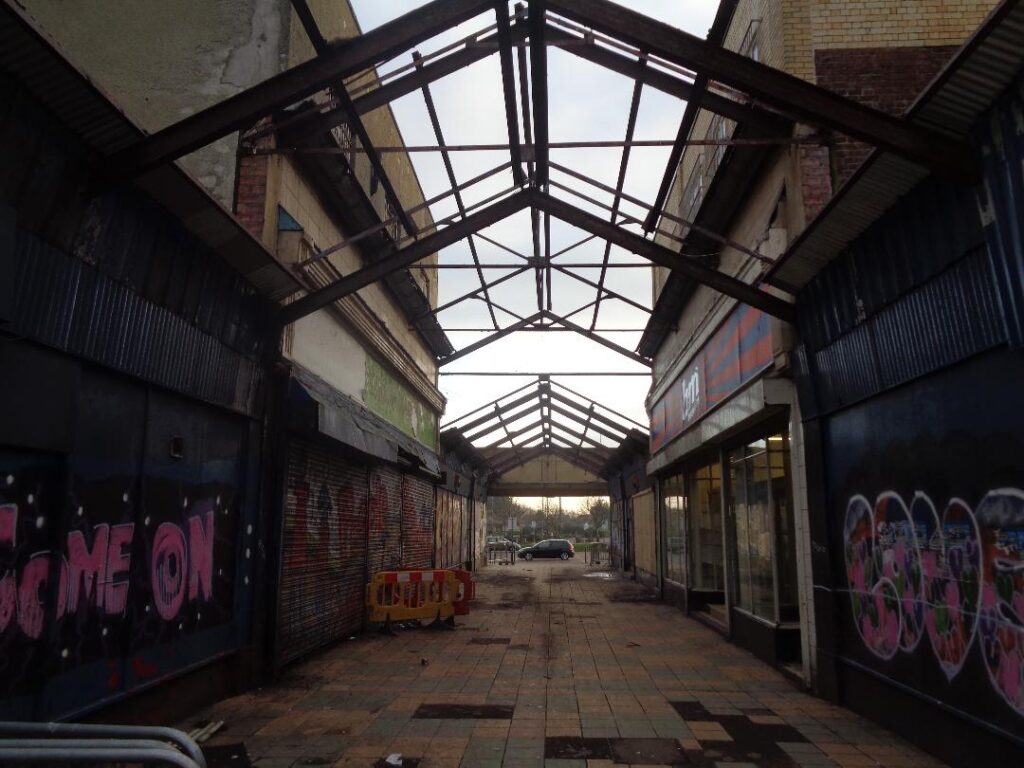 Passageway from Eden, 18th January 2022
Passageway from Eden, 18th January 2022
When I watch Butch Cassidy and the Sundance Kid now, it cannot help but be shot through with nostalgia – most of which is for the period in which I first experienced it. All those very personal associations of a vanished time, of friends and relatives, old music and landscapes, add to the film and enrich it in a way that is not intrinsic to it at all. Naturally, there are far better films which were intended to contain or say something about the era in which they were made and succeeded in doing so, but even these will be immeasurably improved by each individual’s patina of memory.
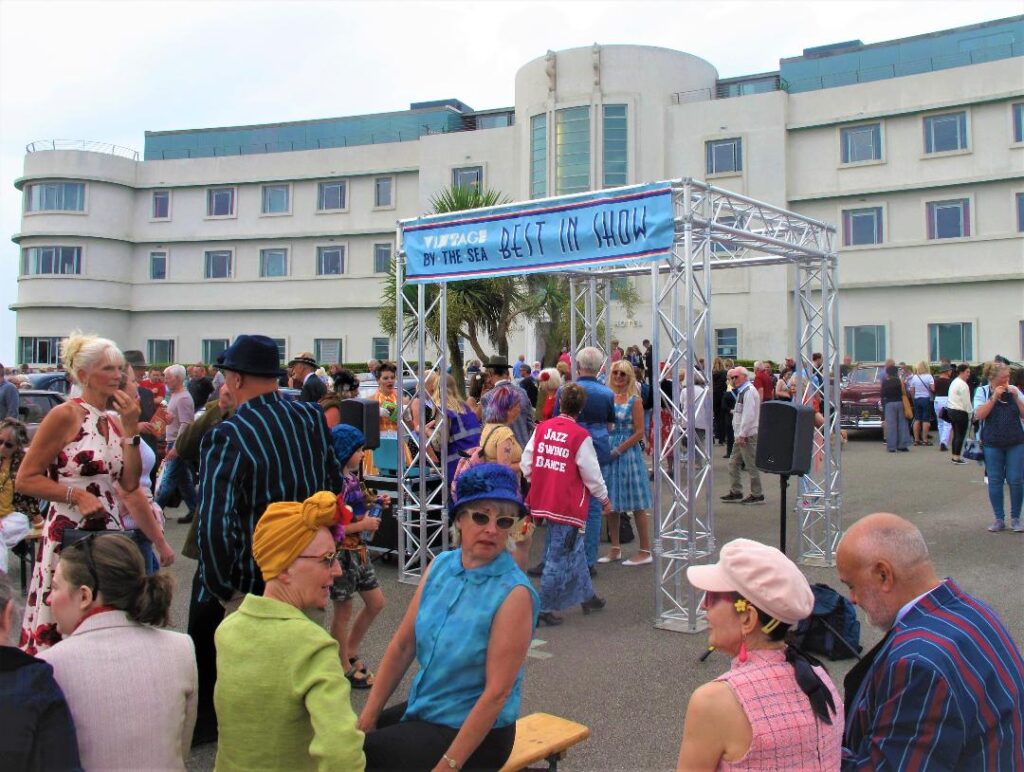 Vintage by the Sea, a festival of the simplest nostalgia, September 2022
Vintage by the Sea, a festival of the simplest nostalgia, September 2022
So, if my (and everyone’s) sense of the 70s (or any time past) can’t help but be a retrospective construction, to what degree is nostalgia a distraction from rightful anger? It could be that because – generally – we can’t help but glow rosily over some or other past while deferring to a present ‘reality’ impossible to direct or control, that we are dragged down by that anaconda of inadvertence[xii]. Both the technological opium of the present within a wider consumerist agenda[xiii] and the golden light of the past are dangerous distractions if we want the overlap of reality to be maintained or preferably, improved.
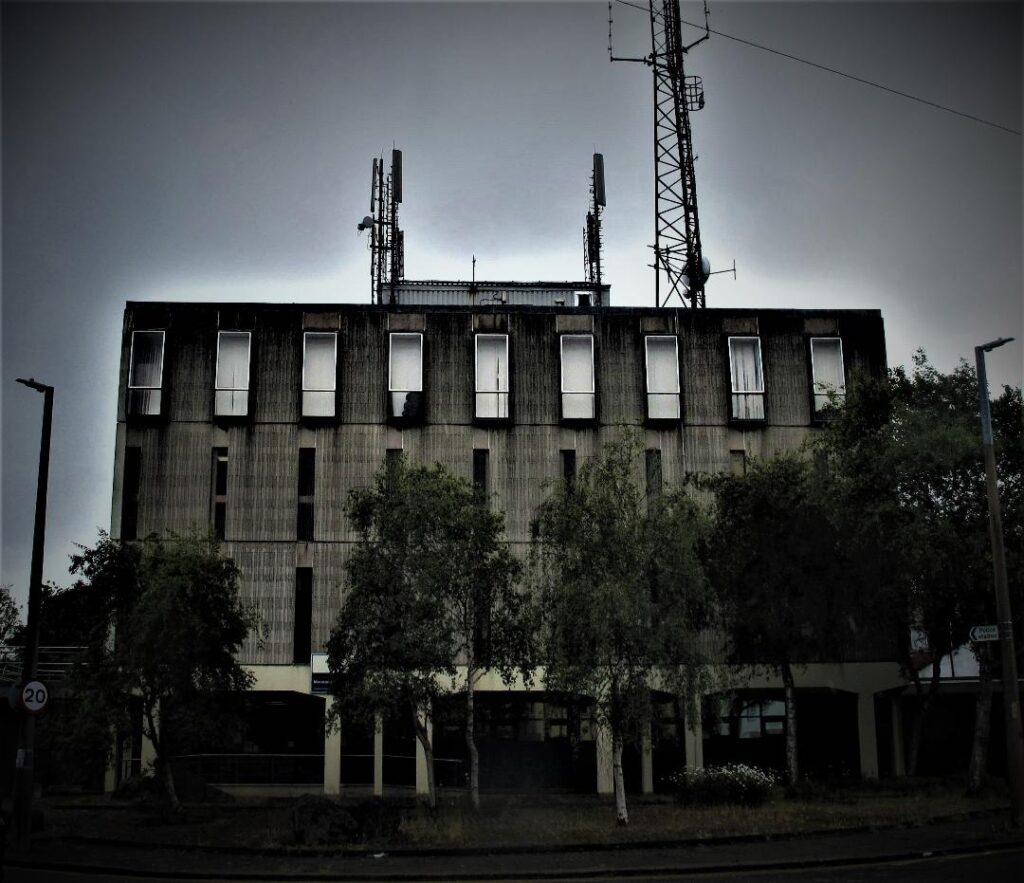 Accompanied by the silver birches, under bright skies, fuzz HQ can carry an air of post-war hope,
Accompanied by the silver birches, under bright skies, fuzz HQ can carry an air of post-war hope,
but when the sun disappears, the same building looks positively totalitarian, 31st May 2022
One of the most depressing things about not living in the middle of nowhere is being reminded every day that the human race will never change – or not enough. Idling engines for example, have become a disease – a wasteful extension of headphones perhaps?

Behind Morrisons, Central Drive, Morecambe, 23rd April 2022
We could do with a lot more of the signs like this one above – I’m so weary of seeing people sitting in cars with the engine running, because they can’t be bothered to put on or take off a jumper or adjust the windows. Turn off the effing sound system or air conditioning and read a book! Yes – those paper things with proper words in them. Or get out and go for a walk for heaven’s sake!
 Midland Hotel, 22nd September 2021
Midland Hotel, 22nd September 2021
Since Michael Bracewell came up in part 8 of this digression[xiv], the following section of a review of his latest novel, Unfinished Business by John Burnside in The New Statesman[xv] (sent to me last month by a good friend living in Essex) seems apposite:
“The underlying malaise of our time is an improperly diagnosed and so routinely untreated nostalgia. The most persuasive historian of this condition was Svetlana Boym, who identified two types of nostalgia. The first stresses nostos, or homecoming, and is “reconstructive and collective”:
The second type puts the emphasis on algia, and does not pretend to rebuild the mythical place called home; it is . . . ironic, fragmentary, and singular. [It] accepts (if it does not enjoy) the paradoxes of exile and displacement. Estrangement, both as an artistic device and as a way of life, is part and parcel of ironic nostalgia.”
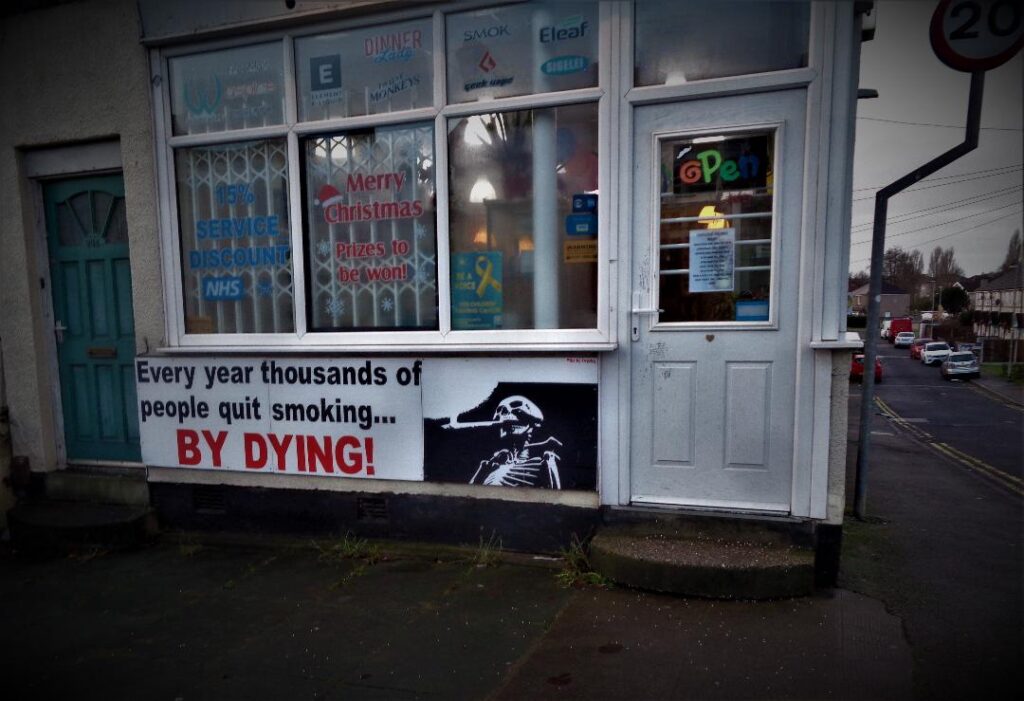
Estrangement and paradox: Up In Smoke on the Lancaster Road, Christmas Eve 2022
(John Burnside in The New Statesman continued):
“Today, in Britain, we see manifestations of both nostalgic modes. We hanker (legitimately) for a time when, as corrupting as money and power might have been, the idea of some greener, more gracious, less mercenary homeland seemed at least feasible. But we are also obliged to search for individual strategies (artistic creation, self-invention, style) that might allow us to express resistance towards a society that seems terminally degraded by narcissism and greed. The result is a form of internal exile, in which community as such seems improbable, at the very least, and any expression of individual freedom is purely gestural.”
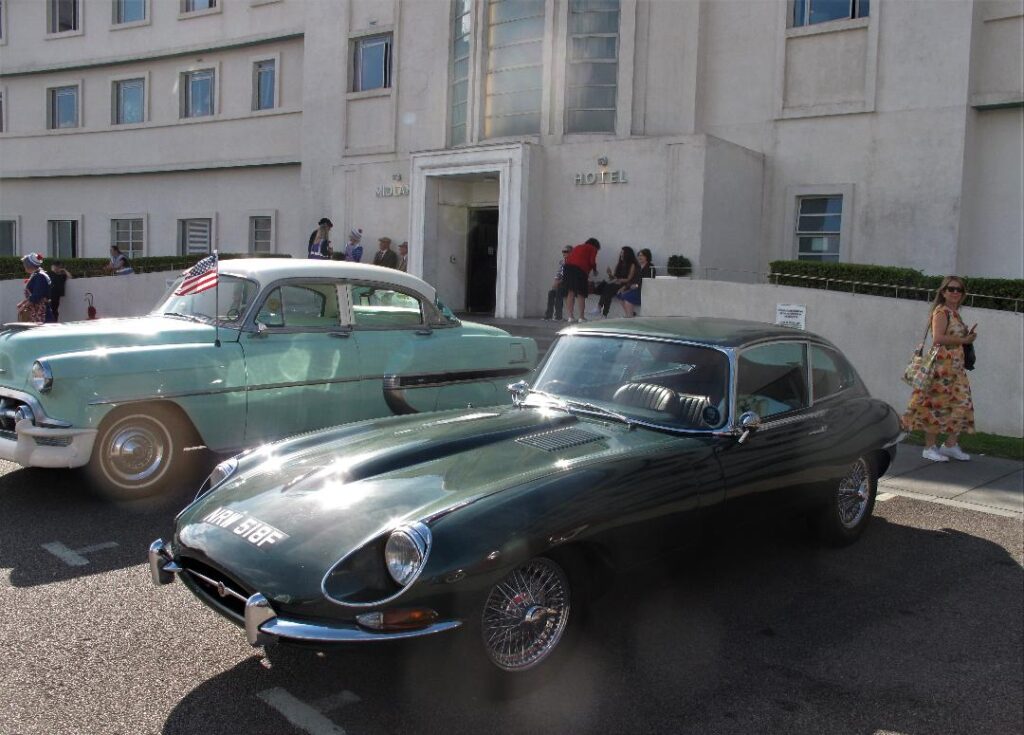
Noble remnants of individual freedom – for the wealthier anyway, 4th September 2022
Shiny cars aside, the Vintage by the Sea[xvi] festival (which in 2022, took place on the 3rd and 4th of September) raised another side-track in my mind when I discovered that one of its co-founders was Morecambe-born, Wayne Hemingway. I haven’t watched TV for years, but remember Hemingway coming across as an amiable enough minor celebrity of the more worthy-seeming type. Not hard, you may say, when most celebrities are so utterly worthless. But it wasn’t thinking about the insignificance of so much of society’s drift and machinations that distracted me, rather a sudden shift in geographical location took me from the Lancashire coast back to the Marches of Wales.
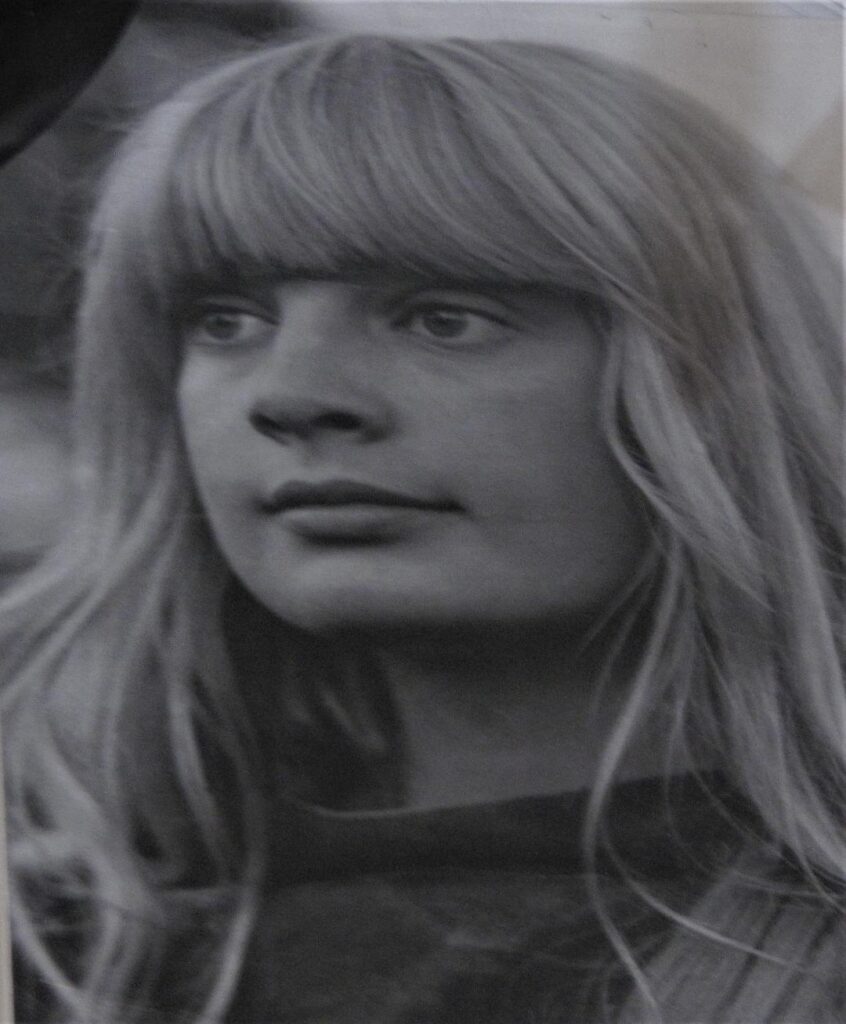
![]()
Stella Mitchell, circa early 70s
A couple of months before Vintage by the Sea, in 2022, I was lucky enough to meet Stella Mitchell at The Land of Lost Content, the museum in Craven Arms[xvii] which houses her and her husband’s lifetime collection of memorabilia – or “rejectamenta” as they call it. Towards the end of our conversation, she became understandably upset by recent developments – chiefly that their partner “I shouldn’t say his name”, had unexpectedly decided to pull out and required the museum premises[xviii]. Rather than helping to preserve Stella and David’s lifetime of curation for posterity, this amiable minor celebrity’s more principled aims had apparently become corrupted by anxiety about – to use that sickening phrase – his ‘financial portfolio’. With the sale and dispersal of their collection inevitable, Stella felt utterly betrayed. Although I heard the museum would remain open for the 2023 season, it appeared to have withdrawn from the public domain when I revisited that summer.

Celebrity pies to order – simply choose your celebrity filling. Land of Lost Content, 30th July 2022
At about this point, due to a “computer glitch” [Rant 17], I lost an entire day’s work on this Digression . . . which – you know how it is when you lose things – inevitably feels as though what you’ve lost must’ve been truly great . . . and is now lost forever. Thanks to several more overwhelming nightmares since, another entire year has now elapsed, making this Digression feel like a ghost trying to materialise from an archive. Local papers detailing the betrayal of Stella Mitchell will be yellowing at the edges.
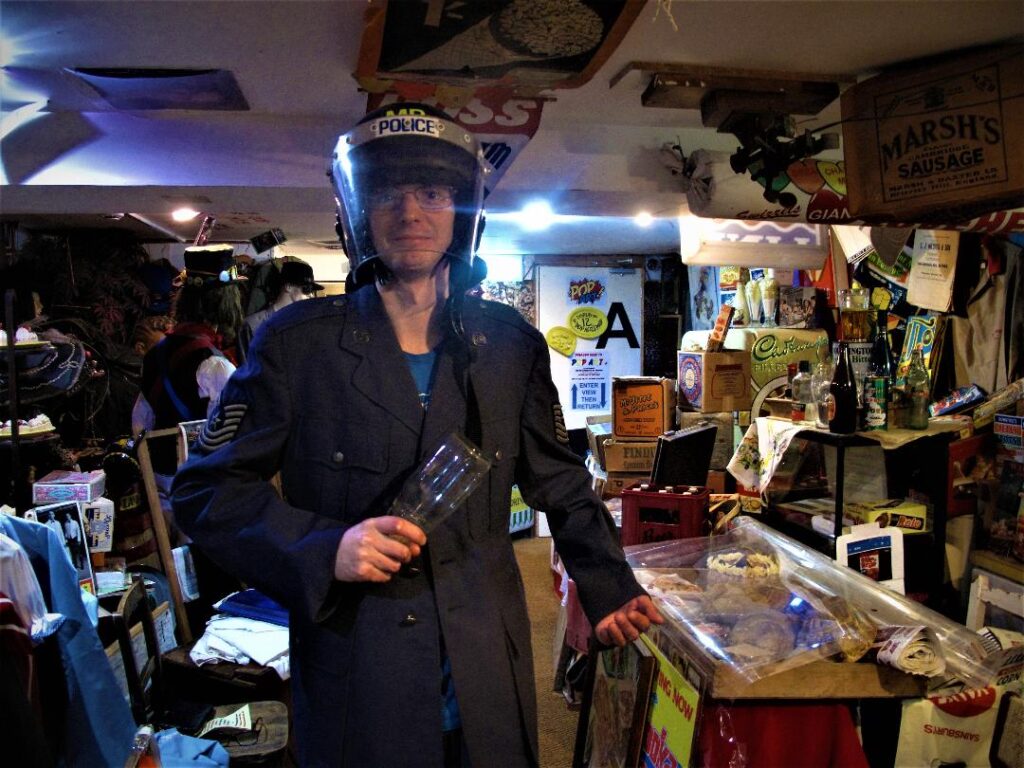
I’m coming for YOU, Wayne! Land of Lost Content, 30th July 2022
As for the glitch, that is now no more than a regretful memory. Despite being half human, Spock[xix] was supposed to proceed rationally, and this is perhaps what everyone assumes of computers? In truth, computers are easily traumatised, struggling much of the time to hold an air of sanity – a comment, which risks granting them ‘personality’. They don’t have to care about the transient or fragmentary, unlike my hopeless attempts to reconstruct thoughts living outside their scope. One of my more desperate notes, which partly illegible, survived the computer’s seizure, runs: “Archetypal mural dreaming of space in layers of beauty! Connect with the arcing dive into the ideal of a swimming pool??” – perhaps referring to a daydream set off by the Arndale mural illustrated below. Or:
“Gold braid and the vanished tapestry, backwards behind the eyes towards an indefinable colour-world where the ground base is Black.
Are invisible strings universal?
Are we isolated, possessed or finally free? The dreams of futures held in the past.
How to regain everything . . .

O the mirage of that diving plunge. Arndale Shopping Centre[xx] mural, Morecambe, Sept 2022
Polished vehicles excluded, the vintage festivals (in both September 2022 and 2023) were a motley assortment pleasingly dotted about the town like an impressionistic poem – though I expect I missed half of it. In 2022, the Saturday was grey and humid at the Midland Hotel where 50s dressed visitors danced and strolled. While the Midland remains an outpost of style – greatly increased by a car park’s worth of proper cars instead of all the contemporary junk which insults our eyes daily – you only have to cross the road to escape the promenade’s façade. This arcade is little more than 100 yards away:
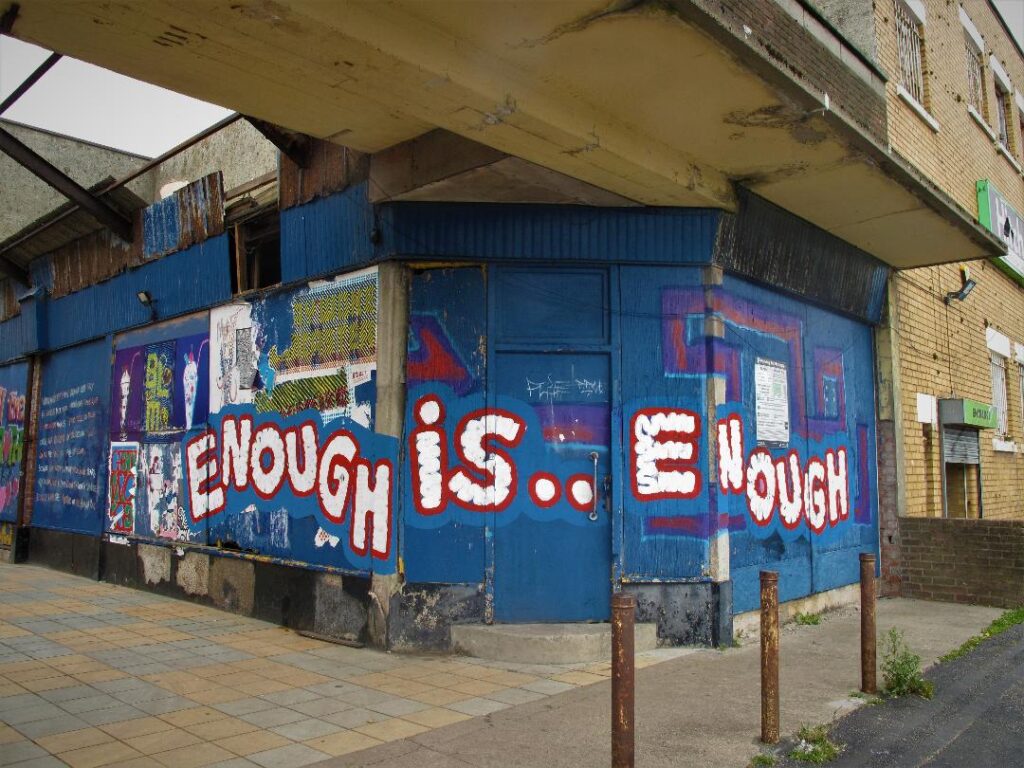
ENOUGH is . . ENOUGH – as much as ever, 3rd September 2022
In another car park beyond, ENOUGH is . . ENOUGH, stalls of antiques and junk awaited browsers and purchasers. One was enlivened by a very amusing barker, bellowing forth the merits of his stuff as “genuine tat”. “It’s all cheap and we’re desperate . . . my wife must be desperate – she married me!” I declared he should be on TV, which seemed to please him. I asked him and his wife whether they had a genuine old-style, stab and lever tin opener of the unbreakable type “my nan always preferred”. Even when she became frail, my nan could rip tins open in seconds. Unfortunately, they had no such marvel. Instead, his wife dug out a simple alternative. It works on the stab principle, but without a proper handle, gives little stabbing force and almost no leverage. Neither stallholder had been able to work out how to use this effectively, so refused to take any money for it. I finally got a can open with it later that evening, but with more fuss than my nan would have stood for. If you used it regularly, you’d develop very strong, rock-climbing hands . . . but it won’t go round the sharp corners of sardine tins.
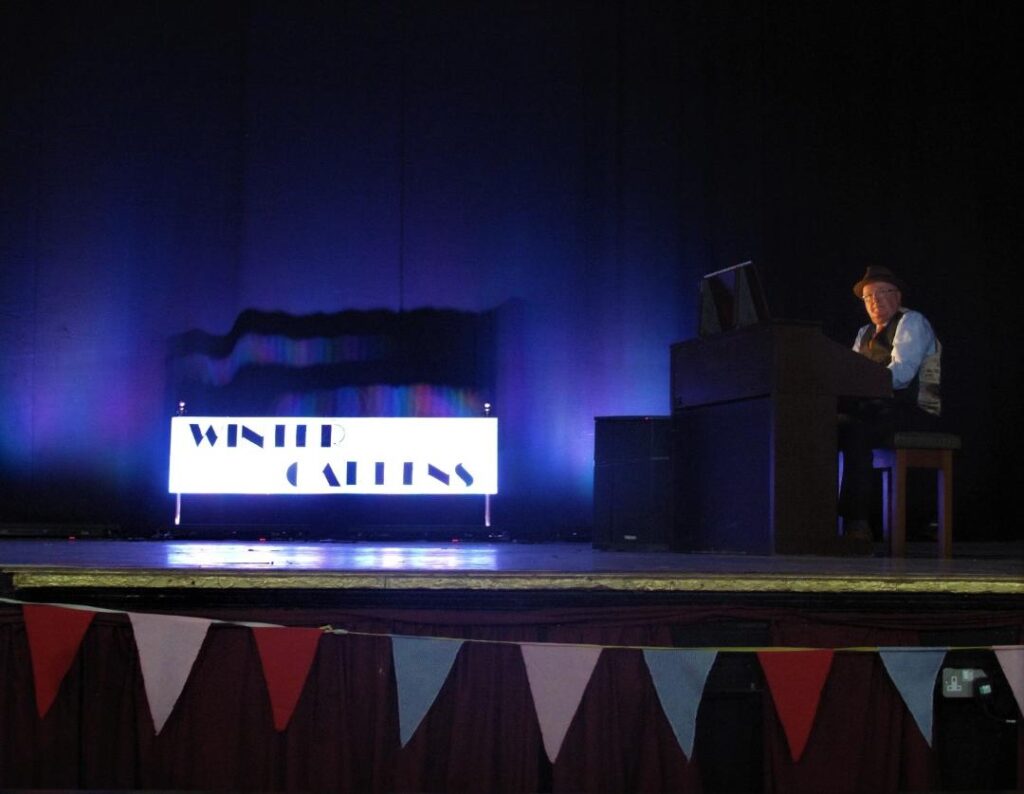
The organist entertains . . . September 3rd 2022
Light rain, encouraged me to investigate the Winter Gardens and be “entertained by the organist” playing a medley of traditional seaside music hall tunes: “Oh I do like to be beside the seaside . . .” Entry was free.
![]()
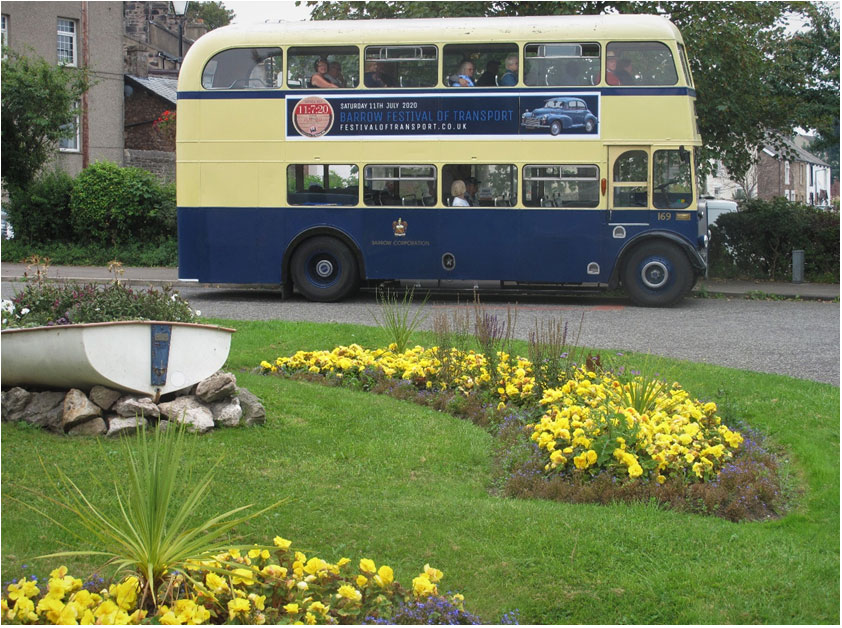 Park Royal bodied Leyland PD2/40 at Heysham old village terminus. September 3rd 2022
Park Royal bodied Leyland PD2/40 at Heysham old village terminus. September 3rd 2022
Following a quick visit to Morrisons, I emerged to find the beautiful blue and cream 1958 double decker above (built for the Barrow in Furness Corporation) departing for Heysham old village (fares by voluntary donation) so I jumped aboard and went upstairs for the 3-mile journey, walking back via the Mad Hatter’s tea gardens. The sun had emerged a little by then. Most of the way I walked by the sea, turning inland nearer home to try and capture some views of other passing buses.
![]()
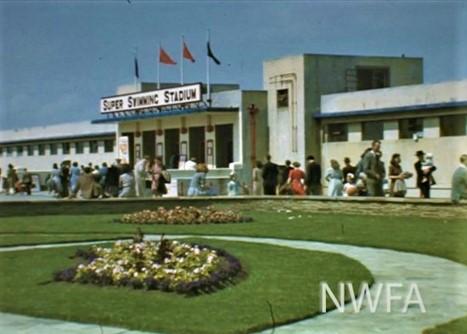
Morecambe’s Super Swimming Stadium circa 1950s
Often known in the past as Bradford-by-the-Sea, Morecambe once possessed what was reputed to be (when opened in 1936) the largest swimming pool in the world. The town was also was a port-of-call in the beauty parade business[xxi] – the Super Swimming Stadium becoming the ideal venue for the first Miss Great Britain Contest in 1945[xxii] . This contest remained an annual fixture for 30 years until the building was closed in 1975, apparently due to “structural problems”[xxiii]. Tragically, it was subsequently razed to the ground.
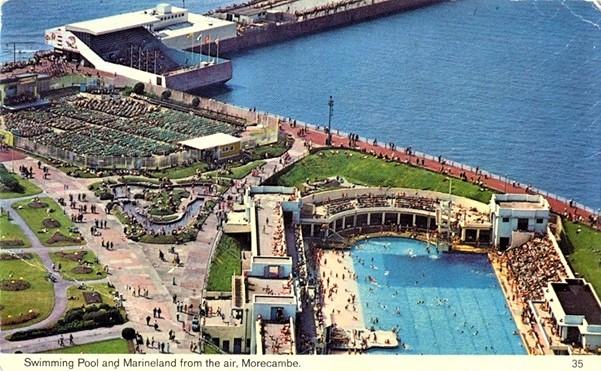
![]() Postcard, circa 1960s?
Postcard, circa 1960s?
As all my text for this next section disappeared by computer seizure, it seems fitting that the following images should serve as an elegy for all that has been lost in Morecambe:
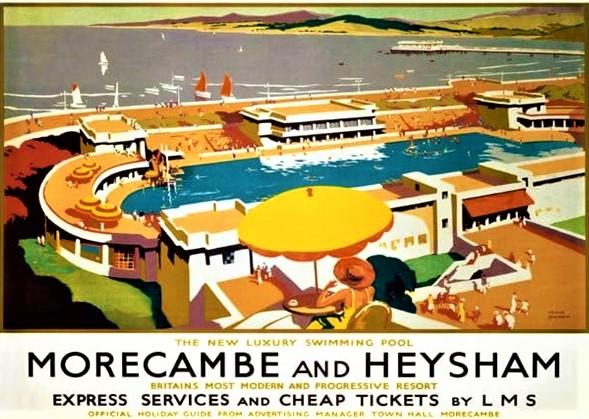
Railway poster, 1930s
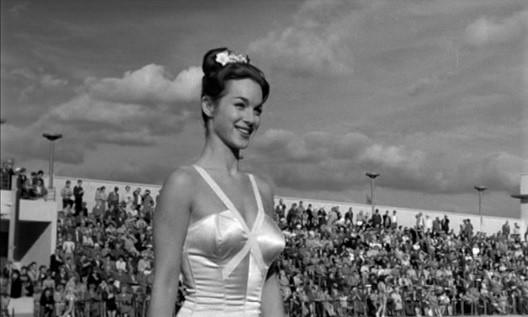
Shirley Anne Field in The Entertainer, 1960, at the Super Swimming Stadium (33 minutes 41 seconds)
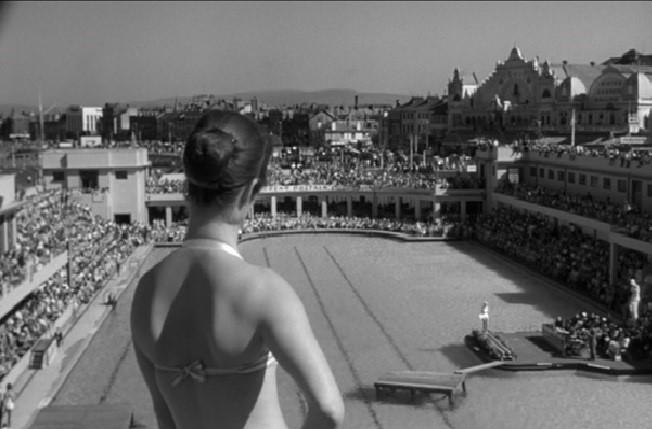
Shirley Anne Field looks down from the high diving board and I feel really angry now for all that has
been destroyed! Note the Winter Gardens building in the background.
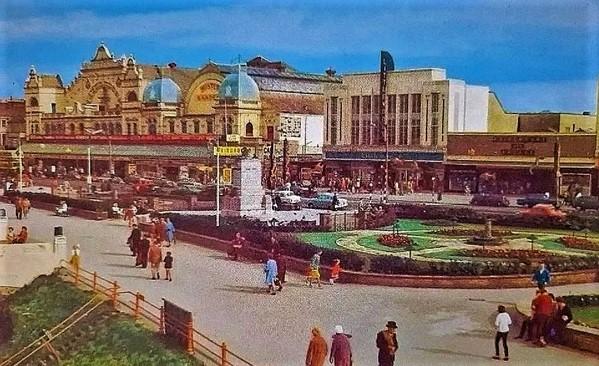
The Winter Gardens building in a colourized late 50s (?) postcard
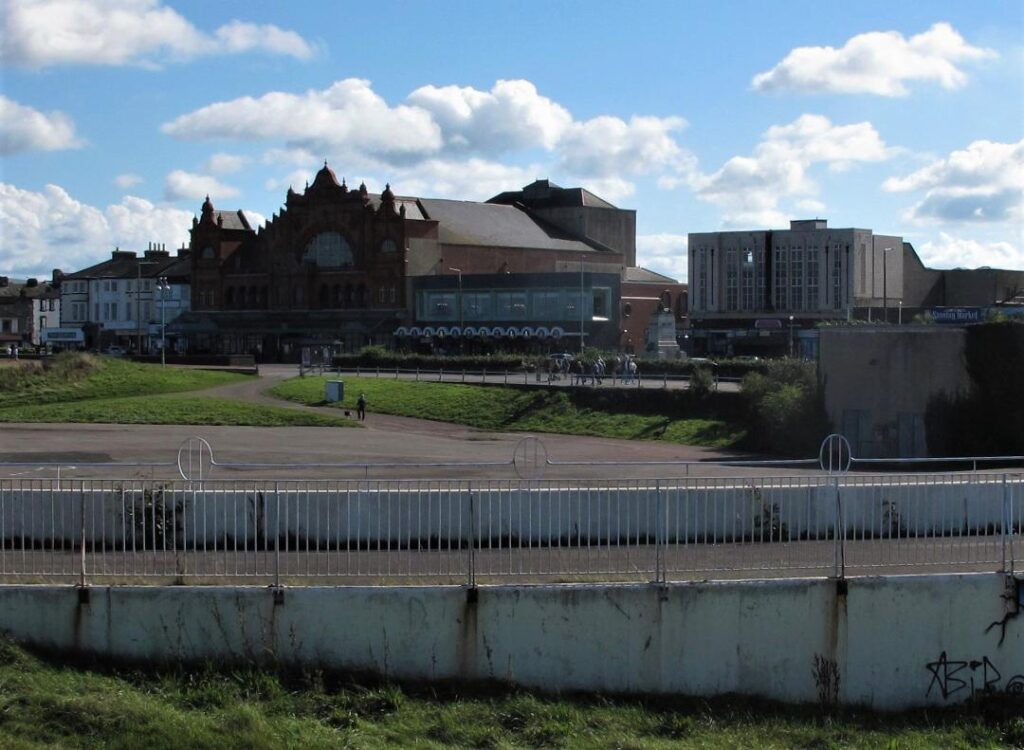
A similarly angled view of the Winter Gardens building from across the site of the
Super Swimming Stadium, September 2022
 Funland seen from the opposite direction in August 2019, on the site of the Super Swimming Stadium.
Funland seen from the opposite direction in August 2019, on the site of the Super Swimming Stadium.
This concrete basin will supposedly form the future site of the Eden project.
In an article in Sight and Sound, entitled Morecambe and Wise at ITV[xxiv], Robert Hanks writes: “For decades the 1977 edition of The Morecambe and Wise Christmas Show on BBC1 was regularly cited as the most-watched programme in British TV history, with 28 million viewers, and the idea became embedded that, in a decade of economic and political anxiety and generational conflict, Eric and Ernie were the thing that brought the nation together; that jokes about Des O’Connor and Luton Town FC were somehow bound up with a sense of Britishness. With hindsight, that’s a dangerous idea – a nation that places too much weight on its comedians is liable to end up being run by a clown, and you can imagine the trouble we’d be in for if that ever happened.”
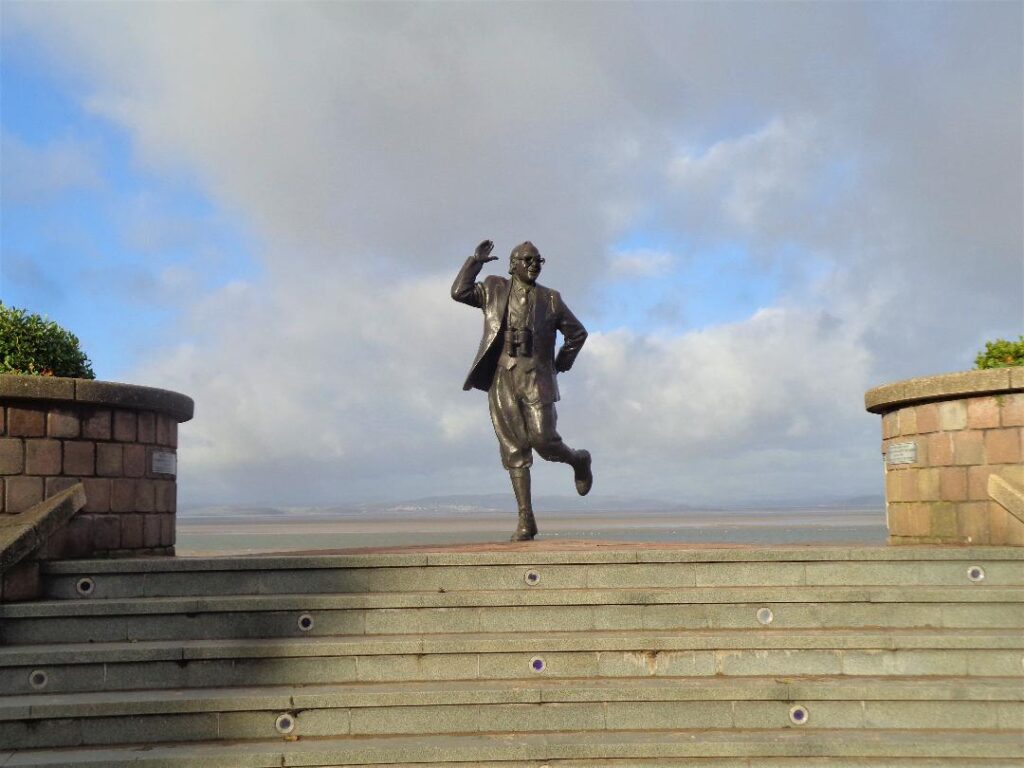
“Bring me sunshine . . .” nostalgia for the 70s is endemic throughout Morecambe. 27th January 2022
That the section above refers to criminal clown Boris Johnson, shows just how delayed part 9 of In Her Kingdom by the Sea, has become. Eric Morecambe[xxv] – despite his posthumous support for Extinction Rebellion as well as for striking workers in 2023[xxvi] – is a far less controversial figure than Boris. Born John Eric Bartholomew in the town in 1926, the comedian took both his stage and surname from the place.

Boris Johnson and Wetherspoon boss, Tim Martin: Brexit enthusiasts together (Getty images)
A pub of the dodgy Wetherspoon[xxvii] chain not far from Morecambe’s Arndale Centre, commemorates Eric’s birth name. Perhaps I should be boycotting the place, but there’s an appealing seediness about The Eric Bartholomew. Its upstairs particularly, has a 70s feel as well as an ever-changing view over a zone of pedestrianised charity shops. Opposite, encouraging a sense of geographical freedom, stands the abandoned, continental flavoured ex-Barclays bank[xxviii] with its steep, red-tiled roofs[xxix].
In the Eric Bartholomew[xxx]
Sun splays the tables from a stormy sky
clouds heroic over the continental rooftop opposite
– grass grown gutters, stopped clock, steep-tiled spires . . .
So, the weather forecast was the usual default:
a bit of everything – does anyone care?
I’m not sure which I disapprove of more: Science or gymnastics,
but obviously the former has done considerably more damage.
“Smile and the whole world smiles with you . . .”
sings a happy customer, drunk already, or just musing?
as the sun washes through the room again
a philosophy which appears to keep him going.
To discern impossible patterns of enigma or escape
cellars upon attics, tomorrow before yesterday:
who weaves this cobweb of day and night?
Evading symmetry or any confluence of meaning
a faux graveyard built in perspective
patterns of lit windows in handheld tenements and terraces
deceptive holes in our peeling backscene,
yet the end result is captivating
a torch for the world
a dream rewritten towards terminus –
as the sun rewrites the mood here
again, again, and the glasses and cups
praise ordinary forgetting.
It’s all about how stories, fact or fiction, end:
dead stop, confusion or aspiring to flight . . .

How many phone conversations aspire to flight? 6th March 2022
The clear freshness on a sunny day of Morecambe’s classic Telephone Exchange . . . Yet the look of this building – where Market Street branches off Central Drive – confuses me. I would’ve guessed it to be a late 50s early 60s design, but drawings of it apparently date back to 1937. An extension drawing is dated 1961 and further drawings dated 1970[xxxi]. In what year it was actually built, I cannot conclusively determine, though I remain pleased to have discovered during a brief search, that my ardent love for Telephone Exchanges is shared[xxxii].
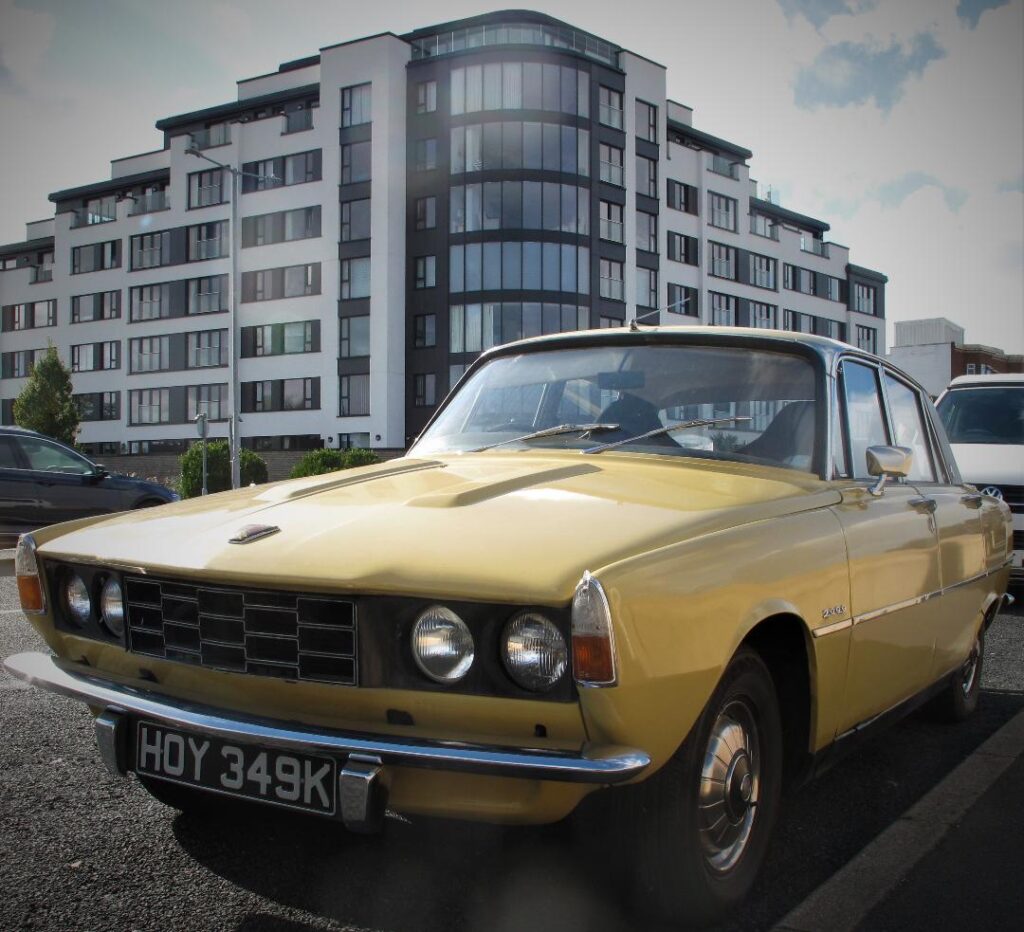
![]()
The past becomes the future and the future the past . . . Rover P6 for sale at the northern end of
Morecambe promenade, October 2022
On the sea front and further out, this early 70s, Rover P6, goes well with the gently stepped, eight storeys of The Broadway[xxxiii]. Such buildings may be little more than pastiche, but in good weather it’s easy to feel forgiving and enjoy the patchwork of eras and atmospheres often found in towns and cities. However, the Rover P6 was for sale. What must the seller feel if they’ve owned the car from new – a thought which raked alive the heritage versus ecology debate. A couple of older friends who own 50s and 60s cars, while appearing resigned to their own demise, remain seriously concerned about the future of their cars. Similarly, regarding staff on preserved railways: most of the qualified steam locomotive and train crews on the North York Moors Railway when I worked there ten years ago, were over 60, many over 70. Considering both the climate and the social crisis, caring about our heritage is, understandably, under threat. Meanwhile, at present, many citizens clearly enjoy seeing vintage and ‘classic’ vehicles driving about to provide daydreams of simple nostalgia:
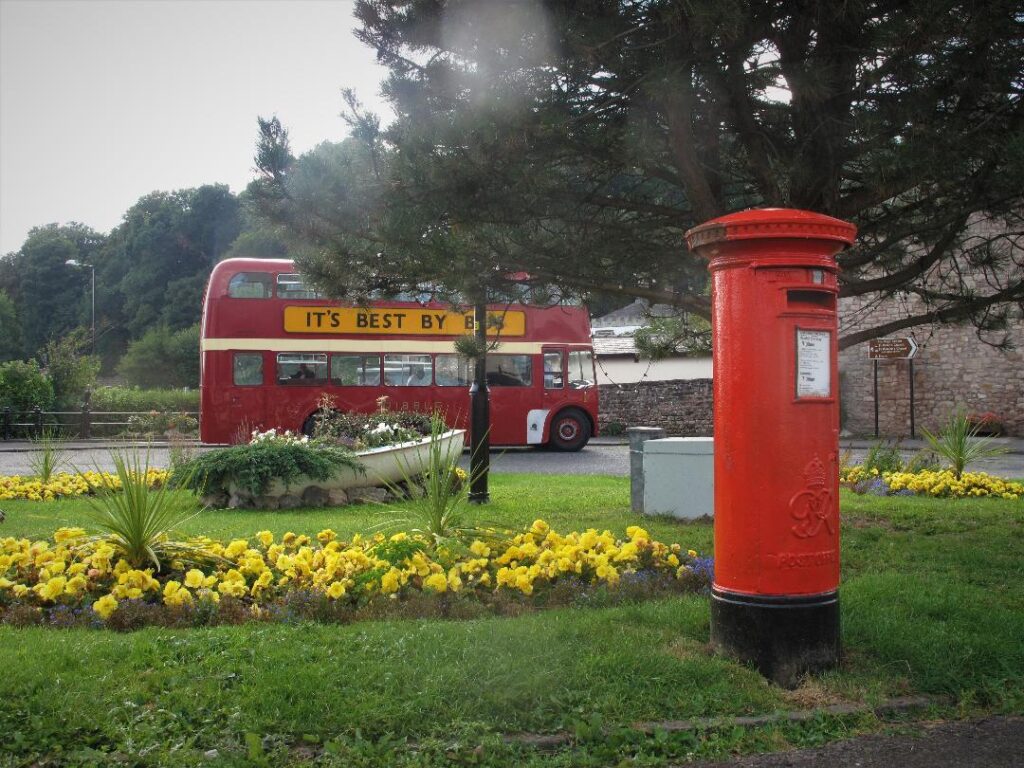
Heysham old village, 4th Sept 2022
More than nostalgia, it is a great relief to glimpse any real cars – so much more satisfying to the eye than the sleek, plastic illusions or ugly, lumpen, four-wheel-drive toads of today (forgive the insult to toads). Cars in any form are becoming a liability, yet will we all keep calm and carry on until everything grinds to a halt around us? So far, that World War 2 query: Is Your Journey Really Necessary – rarely arises, despite that most of the journeys we make, are clearly not. Gradually however, as everyone is forced either to walk, cycle or take public transport, will cars come to seem a privilege of the rich?

Stanley Road wayside pulpit, 4th March 2024: We could certainly do with a few miracles.
Bresson’s Lancelot du Lac (1974)[xxxiv] begins and ends with a violent absurdity which unfortunately, cannot in retrospect, avoid seeming Pythonesque, despite that it almost certainly influenced 1975’s Monty Python and the Holy Grail[xxxv]– a great film also, but in a completely different register. Yet regardless of this opening and closing absurdity and despite the spiritual and philosophical focus of Bresson’s film, a sense of a sharply divided society hovers behind – of knights above peasants, elite principles versus grindingly pragmatic daily life. Has ‘progress’ meaningfully alleviated this? Perhaps for a while and in some small ways, but for too long now, rich and poor are dividing at speed, and today’s ‘elites’ pretend to neither principles nor intelligence. In a society where all too many pointless things are possible, to quote Lancelot (“Lance-low” as Bresson’s French cast pronounce it), “I crave the impossible[xxxvi].”
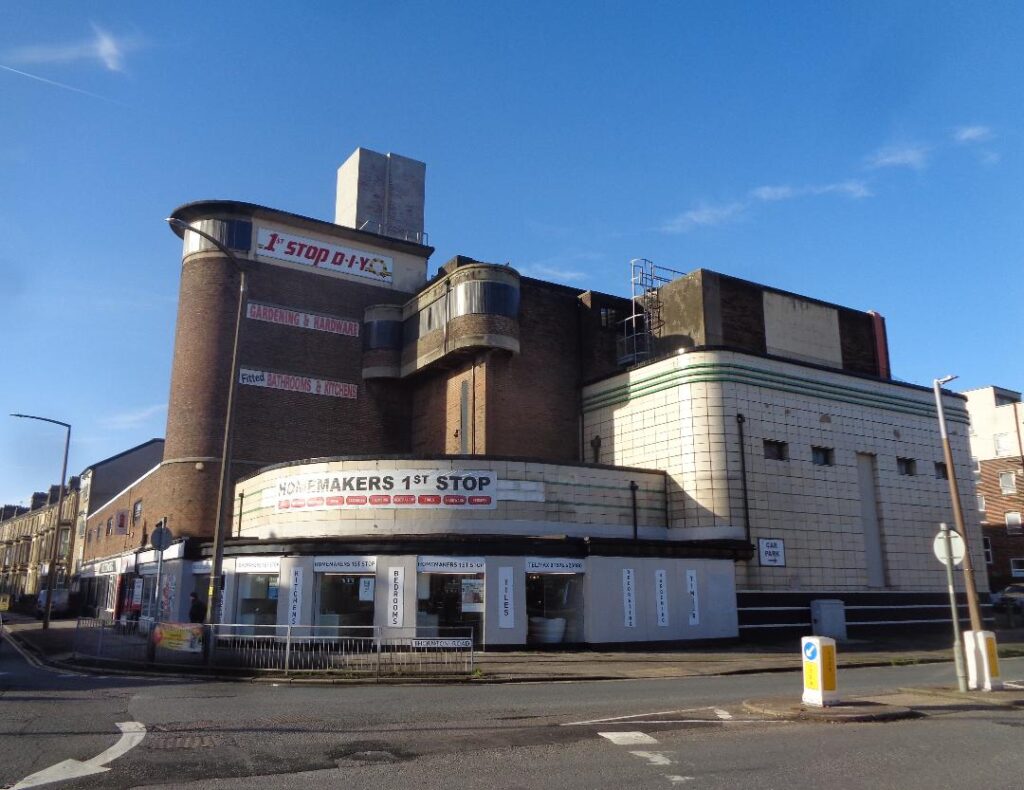
Holy Grail of cinemas[xxxvii] February 9th 2022. The great thing about films – good films – is that
you can absorb whole other atmospheres and lives in a couple of hours.
The local film club showed Vanishing Point (1971)[xxxviii] the other week, with the white 1970 Dodge Charger, blasting its way all over America . . . and the audience, from age 30 upwards, loved the sight and sound of this gas-guzzler. Everyone wanted a Charger in fantasy, but equally accepted that it was a “relic”, a soon-to-be impossibility in the modern world. At one point in the film, the fuel tank is filled for a few dollars. How much would it cost now? How much should it have cost then? Meanwhile, if a wealthy horse-riders club were launched to encourage its members to gallop off in search of the Holy Grail, how would such folly be viewed by the general public?
On a walk last weekend passing St John the Devine, I realised – after two years of hearing their joyful Sunday clanging only in the distance – that the church bells were a recording, playing from a loudspeaker perhaps in the tower!
fake, ersatz, entirely disconnected,
not a person nor a rope comes into it![xxxix]
When and how and should such traditions be allowed to die? Must church bells and classic cars become museum pieces from a variation of the age of chivalry? Are habituated consumption and destruction the only ‘grails’ which retain a wide interest? Who can avoid craving the impossible?
© Lawrence Freiesleben,
Cumbria and Morecambe, January 2023 – March 2024
NOTES All notes accessed between November 2022 and March 2024
[i] From https://en.wikipedia.org/wiki/Captain_Black_(Captain_Scarlet) “Black has also been interpreted as part of a supposed religious allegory in the series. Grant and other commentators have compared Cloudbase (Spectrum’s airborne headquarters, protected by a fighter squadron codenamed “the Angels”) to Heaven, Colonel White (the head of Spectrum) to God, and the resurrected Captain Scarlet (White’s top agent) to the Son of God; Black, a Spectrum officer-turned-Mysteron agent, is viewed as either an analogue of the Devil (a fallen angel) or a Judas figure in league with the “satanic” Mysterons of the planet Mars (which Grant likens to Hades). Anderson denied that any of this symbolism was intentional.
[ii] Warning a friend that I’d eaten a lot of garlic before coming out (not just against vampires) she replied not to worry: “covid destroyed my sense of smell”. It has never come back, but she was glad because she works in hospitals. “But what about the scent of roses”, I asked, then felt guilty for reminding her . . .
[iii] See part 8 of this Digression: internationaltimes.it/in-her-kingdom-by-the-sea-part-8/ In the event, the Mysterons never showed up. Thankfully, my son came to the rescue in October 2023, finishing the kitchen with me as occasional assistant.
[iv] internationaltimes.it/my-small-press-writing-day/
[v] Last stanza of Imagination can be the truth for which the parade of reality is merely a sketch (December 2022):
But we are lost in the universe, dust of the firmament
the darkness or light beyond infinity’s eyes
Impasse des Anges . . . and we may overlap ourselves or not
no one cares.
Love is a willing of the heart
Driven to extremes
it departs,
to live in the trees, the clouds, the rushing waters
or even certain silent suburbs, the doorways and driveways of half-forgotten houses
their colours and tones, their mood which no-one notices
anything yesterday to defy the soil
but today my calmness is endless
and the rocks no longer need to cry out.
[vi] goodreads.com/en/book/show/134026
[vii] There is a presumably apocryphal story circulating in Morecambe that the Helter Skelter was first thought up by a Morecambe-dwelling man by the name of Mr Helter. Unfortunately, I can’t find any evidence for this. en.wikipedia.org/wiki/Helter_skelter_(ride)# Most internet references jump to The Beatles or Charles Manson!
[viii] It also illustrated the degree to which personal subjectivity is a key factor inevitably influencing or even creating, the interaction between any potential art and its supposedly passive, ‘receiving’ audience – an observation often brought up before, in for example: internationaltimes.it/donnie-darko-a-digression-on-universality-and-inevitable-nostalgia/ of March 2020:
“Art should be a doorway not to the production of more art – too much of which is just a pretty or ugly wall with no openings – but to the more intense life around and inside you.”
[ix] en.wikipedia.org/wiki/Heysham_to_M6_Link_Road
[x] See note vii above . . . they underline “that all the best art is already inside you.” Butch Cassidy and the Sundance Kid is certainly in the borderland between entertainment and art.
[xi] internationaltimes.it/rishi-sunaks-united-nemesis/
[xii] “Society appears to slide on like some vast anaconda with us caught in its coils forced into one or other, more or less destructive form of distraction . . .” https://internationaltimes.it/rishi-sunaks-united-nemesis/
[xiii] Another factor which illustrated this yesterday was our washing machine packing up. It was pretty old and for a while every now and then I’d had to transfer washing to the bath to rinse and wring it out. Checking it wasn’t something I could fix – a broken suspension mounting etc., I was obliged to start looking at new machines. But there are so many and they all do far too much. Thanks to supposed “free market” competition, the choice is as enormous as the waste involved. There must be graveyards of unused, superseded machines all across the globe. Four different sizes of ACME washing machine would be plenty. I often wonder how different the world might have been if we had decided, say a century ago, to aim for cooperation and simple efficiency rather than a competition which panders to the lie of economics and our consumerist endgame. Instead of a human world upon the brink of collapse, oh what we might have had instead!
[xiv] https://internationaltimes.it/in-her-kingdom-by-the-sea-part-8/
[xv] https://www.newstatesman.com/culture/books/2023/02/michael-bracewell-anatomy-english-nostalgia-book-review
[xvi] www.vintagefestival.co.uk/vintage-by-the-sea/
[xvii] en.wikipedia.org/wiki/Land_of_Lost_Content_(museum)
[xviii]shropshirestar.com/news/local-hubs/south-shropshire/2022/06/16/curator-of-much-loved-shropshire-museum-to-sell-off-collection/ SEE COMMENT by DANSETTE456 beyond the end of this Shropshire Star article
[xix] en.wikipedia.org/wiki/Spock
[xx] Opened in May 1972, the Arndale was and is a very poor substitute for “one of the grandest of the 1930s modernist seaside lidos”: c20society.org.uk/lost-modern/super-swimming-stadium-morecambe# closed in 1975 and demolished with criminal promptness a year later. It’s hard to pin down when exactly this mural, Beauty Surrounds, Health Abounds – echoing the 30s style of the Swimming Stadium – was created. This site environmentalsculptures.wordpress.com/morecambe-murals/ divides the Poulton group of murals by Patricia Haskey and Graham Lowe (“1995?”) from the decopublique.co.uk/fantasticmorecambe murals of 2014, but Beauty Surrounds, Health Abounds appears in neither group . . . although this link arndalemorecambe.co.uk/news/local-artist-restores-mural implies that it was part of the Morecambe Icons series originally created in 2016.
[xxi] www.lep.co.uk/heritage-and-retro/retro/golden-age-of-the-beauty-pageant-when-hopefuls-flocked-to-lancashire-3050609
[xxii] en.wikipedia.org/wiki/Miss_Great_Britain
[xxiii] c20society.org.uk/lost-modern/super-swimming-stadium-morecambe#
[xxiv] Volume 32, Issue 1, Winter 2021-22
[xxv] en.wikipedia.org/wiki/Eric_Morecambe
[xxvi] internationaltimes.it/eric-morecambe-extinction-rebellion-supports-the-strikers/
[xxvii] jdwetherspoon.com/pubs/all-pubs/england/lancashire/the-eric-bartholomew-morecambe
[xxviii] lancasterguardian.co.uk/business/iconic-former-bank-in-central-morecambe-expected-to-be-sold-for-ps250k-at-auction-3154765
[xxix] historicengland.org.uk/listing/the-list/list-entry/1279833 This official, Grade 2, listed building is described thus: Bank. Circa 1900. Sandstone ashlar with steep red tile roof. Bavarian or Swiss style. 3 storeys with 2 attic storeys. The 2 facades have moulded string courses, a frieze above the ground floor, and a cornice. The bays are separated by semi-octagonal buttresses. The windows mostly have a single light below a transom and 2 or 3 lights above. The attic storeys finials. The corner which is canted is emphasised by a tiled spire with lead finial. Above the corner doorway, which now contains a late C20 aluminium-framed door, is a timber window set back behind stone mullions, and a carved frieze with a bird within an oval panel. 2 chimneys on the roof which runs east-west.
[xxx]‘Poem’ of mostly November 2023
[xxxi] modernmooch.com/2023/10/23/telephone-exchange-morecambe/
[xxxii] telephone-exchanges.org.uk/exchanges/lancaster-exchanges/
[xxxiii] The Broadway, completed in August 2019, mhstaintonhomes.co.uk/developments/the-broadway/ is one of the buildings visible on the shoreline from miles away: See part 7 of this Digression: internationaltimes.it/in-her-kingdom-by-the-sea-part-7/
[xxxiv] imdb.com/title/tt0071737/?ref_=nv_sr_srsg_2_tt_6_nm_2_q_Lancelot
[xxxv] imdb.com/title/tt0071853/?ref_=nv_sr_srsg_0_tt_4_nm_4_q_monty
[xxxvi] Though Lancelot’s craving may be more to do with romantic love and lust than with the metaphysical:
Dialogue from 32m, 21 seconds:
Guinevere: What have we done?
Lancelot: Guinevere, my heart . . .
Guinevere: Take this heart. Take this soul. They belong to you
Lancelot: It is your body I want.
Guinevere: Take this forbidden body. Take it, revive it . . .
Dialogue from 1hr 14m, 12 seconds:
Guinevere: He [Arthur] will not listen. He has right on his side.
Lancelot: Right is not justice
Guinevere: Forget justice.
Lancelot: Stay with me Guinevere
Guinevere: It was too good. It is no longer possible.
Lancelot: I crave the impossible.
[xxxvii] lancastercivicsociety.uk/2024/01/06/weekend-walk-2-morecambe-in-the-1930s/#
[xxxviii] en.wikipedia.org/wiki/Vanishing_Point_(1971_film)
[xxxix] Sandylands – a ‘poem’ of February 2024
.

I know what you mean about walks with and without the means to record, and how losing work changes how it was. Perspectives, man…
Comment by Martin Palmer on 9 April, 2024 at 4:44 pmBut yeah, I enjoyed this a lot. Been thinking about that kind of Venn diagram of ‘reality’ that you described ever since
In fact, it has made me think differently on my walks around Morecambe.